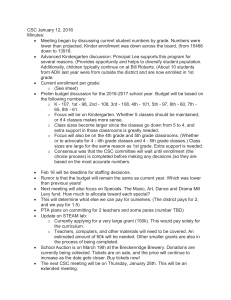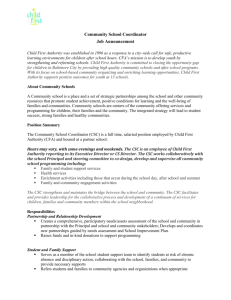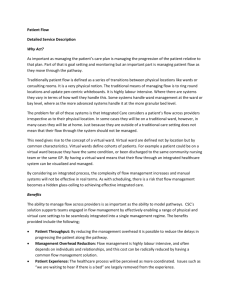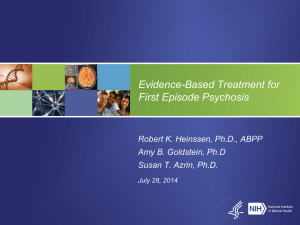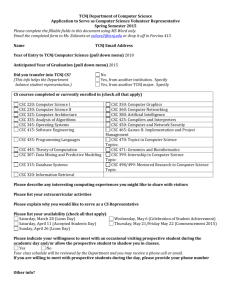UofT Computer Science Graduate Programs: MSc, MScAC, PhD
advertisement
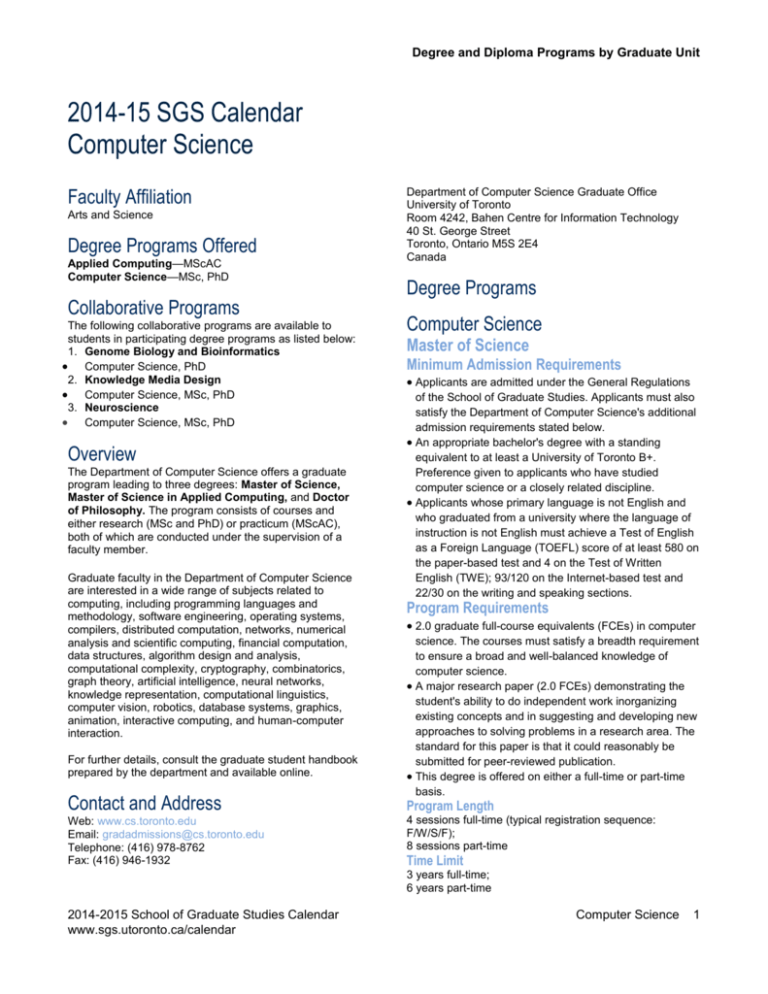
Degree and Diploma Programs by Graduate Unit 2014-15 SGS Calendar Computer Science Faculty Affiliation Arts and Science Degree Programs Offered Applied Computing—MScAC Computer Science—MSc, PhD Collaborative Programs The following collaborative programs are available to students in participating degree programs as listed below: 1. Genome Biology and Bioinformatics Computer Science, PhD 2. Knowledge Media Design Computer Science, MSc, PhD 3. Neuroscience Computer Science, MSc, PhD Overview The Department of Computer Science offers a graduate program leading to three degrees: Master of Science, Master of Science in Applied Computing, and Doctor of Philosophy. The program consists of courses and either research (MSc and PhD) or practicum (MScAC), both of which are conducted under the supervision of a faculty member. Graduate faculty in the Department of Computer Science are interested in a wide range of subjects related to computing, including programming languages and methodology, software engineering, operating systems, compilers, distributed computation, networks, numerical analysis and scientific computing, financial computation, data structures, algorithm design and analysis, computational complexity, cryptography, combinatorics, graph theory, artificial intelligence, neural networks, knowledge representation, computational linguistics, computer vision, robotics, database systems, graphics, animation, interactive computing, and human-computer interaction. For further details, consult the graduate student handbook prepared by the department and available online. Contact and Address Web: www.cs.toronto.edu Email: gradadmissions@cs.toronto.edu Telephone: (416) 978-8762 Fax: (416) 946-1932 Department of Computer Science Graduate Office University of Toronto Room 4242, Bahen Centre for Information Technology 40 St. George Street Toronto, Ontario M5S 2E4 Canada Degree Programs Computer Science Master of Science Minimum Admission Requirements Applicants are admitted under the General Regulations of the School of Graduate Studies. Applicants must also satisfy the Department of Computer Science's additional admission requirements stated below. An appropriate bachelor's degree with a standing equivalent to at least a University of Toronto B+. Preference given to applicants who have studied computer science or a closely related discipline. Applicants whose primary language is not English and who graduated from a university where the language of instruction is not English must achieve a Test of English as a Foreign Language (TOEFL) score of at least 580 on the paper-based test and 4 on the Test of Written English (TWE); 93/120 on the Internet-based test and 22/30 on the writing and speaking sections. Program Requirements 2.0 graduate full-course equivalents (FCEs) in computer science. The courses must satisfy a breadth requirement to ensure a broad and well-balanced knowledge of computer science. A major research paper (2.0 FCEs) demonstrating the student's ability to do independent work inorganizing existing concepts and in suggesting and developing new approaches to solving problems in a research area. The standard for this paper is that it could reasonably be submitted for peer-reviewed publication. This degree is offered on either a full-time or part-time basis. Program Length 4 sessions full-time (typical registration sequence: F/W/S/F); 8 sessions part-time Time Limit 3 years full-time; 6 years part-time 2014-2015 School of Graduate Studies Calendar www.sgs.utoronto.ca/calendar Computer Science 1 Degree and Diploma Programs by Graduate Unit Doctor of Philosophy Minimum Admission Requirements Applicants are admitted under the General Regulations of the School of Graduate Studies. Applicants must also satisfy the Department of Computer Science's additional admission requirements stated below. Successful completion of an appropriate master's degree with a standing equivalent to at least a University of Toronto B+. In exceptional circumstances, applicants may be admitted to this program directly from a bachelor's degree witha standing equivalent to at least a University of Toronto A-. Preference is given to applicants who have studied computer science or a closely related discipline. Applicants whose primary language is not English and who graduated from a university where the language of instruction is not English must achieve a TOEFL score of at least 580 on the paper-based test and 4 on the TWE; 93/120 on the Internet-based test and 22/30 on the writing and speaking sections. Program Requirements Students entering the PhD program with a computer science master's degree will require 2.0 full-course equivalents (FCEs) and a thesis. Students admitted to the PhD directly from a bachelor's degree will require 4.0 FCEs and a thesis. The courses must satisfy a breadth requirement to ensure a broad and well-balanced knowledge of computer science. The most important part of doctoral work is original research conducted under the direction of a faculty member. This research must constitute a significant and original contribution to computer science. The results must be presented in a thesis and defended at the departmental oral examination and the Doctoral Final Oral Examination. Program Length language of instruction is not English must achieve a Test of English as a Foreign Language (TOEFL) score of at least 580 on the paper-based test and 4 on the Test of Written English (TWE); 93/120 on the Internet-based test and 22/30 on the writing and speaking sections. Three letters of support from faculty and/or employers. A statement of purpose. Program Requirements This is a 16-month professional master's program comprising 3.0 full-course equivalents (FCEs) of coursework and an eight-month industrial internship. The internship (3.5 FCEs) is coordinated by the department, and evaluated on a pass/fail basis. There is no thesis requirement. Program Length 4 sessions full-time (typical registration sequence: F/W/S/F) Time Limit 3 years full-time Course List Not all courses are offered every year. Please consult the department for course offerings. Programming Languages and Methodology CSC 2104H Formal Methods of Program Design CSC 2106H Requirements Engineering CSC 2107H Compilers and Interpreters CSC 2108H Automated Verification CSC 2125H Algorithmic Program Verification CSC 2130H Empirical Research Methods in Software Engineering 4 years full-time; 5 years direct-entry Time Limit 6 years full-time; 7 years direct-entry Applied Computing Master of Science in Applied Computing Minimum Admission Requirements Applicants are admitted under the General Regulations of the School of Graduate Studies. Applicants must also satisfy the Department of Computer Science's additional admission requirements stated below. An appropriate bachelor's degree in computer science. A minimum average grade of B+ over the final two years of undergraduate studies. Applicants whose primary language is not English and who have graduated from a university where the primary 2014-2015 School of Graduate Studies Calendar www.sgs.utoronto.ca/calendar Computer Systems: Hardware and Software CSC 2203H Packet Switch and Network Architectures CSC 2206H Computer Systems Modelling CSC 2208H Advanced Operating Systems CSC 2209H Computer Networks CSC 2221H Introduction to Distributed Computing CSC 2226H Topics in Verification CSC 2227H Topics in the Design and Implementation of Operating Systems Computer Science 2 Degree and Diploma Programs by Graduate Unit CSC 2228H Topics in Mobile and Pervasive Computing CSC 2413H Combinatorial Methods and Designs CSC 2229H Topics in Multiple Access Communications Networks CSC 2414H Topics in Applied Discrete Mathematics CSC 2418H Computational Structural Biology CSC 2231H Topics in Computer Systems CSC 2420H Algorithm Design, Analysis and Theory CSC 2232H Topics in Computer System Performance and Reliability CSC 2421H Algebraic and Combinatorial Techniques in Complexity Theory CSC 2233H Topics in Storage Systems CSC 2422H Reasoning About Knowledge CSC 2427H Topics in Graph Theory Numerical Analysis and Scientific Computation CSC 2301H CSC 2305H Numerical Solution of Initial Value Problems for Ordinary Differential Equations Numerical Methods for Optimization Problems CSC 2306H High Performance Scientific Computing CSC 2307H Numerical Software CSC 2310H Computational Methods for Partial Differential Equations CSC 2321H Matrix Calculations CSC 2322H Boundary Problems for Ordinary Differential Equations CSC 2326H Topics in Numerical Analysis Computational Complexity Artificial Intelligence CSC 2501H Computational Linguistics CSC 2502H Knowledge Representation and Reasoning CSC 2503H Foundations of Computer Vision CSC 2506H Probabilistic Learning and Reasoning CSC 2511H Natural Language Computing CSC 2512H Constraint Satisfaction Problems CSC 2515H Introduction to Machine Learning CSC 2517H Discrete Mathematical Models of Sentence Structure CSC 2518H Spoken Language Processing CSC 2519H Natural Language Semantics CSC 2401H Introduction to Computational Complexity CSC 2520H The Computational Lexicon CSC 2404H Computability and Logic CSC 2523H Object Modelling and Recognition CSC 2405H Automata Theory CSC 2528H Advanced Computational Linguistics CSC 2411H Linear Programming and Combinatorial Optimization CSC 2530H Computer Vision for Advanced Digital Photography CSC 2415H Advanced Topics in Distributed Computing CSC 2532H Dynamical Systems and Artificial Intelligence CSC 2416H Machine Learning Theory CSC 2533H Foundations of Knowledge Representation CSC 2426H Fundamentals of Cryptography CSC 2534H Decision Making Under Uncertainty CSC 2429H Topics in the Theory of Computation CSC 2535H Advanced Machine Learning CSC 2539H Topics in Computer Vision Applied Discrete Mathematics CSC 2410H Introduction to Graph Theory 2014-2015 School of Graduate Studies Calendar www.sgs.utoronto.ca/calendar Computer Science 3 Degree and Diploma Programs by Graduate Unit CSC 2540H Special Topics in Computational Linguistics CSC 2541H Topics in Machine Learning CSC 2542H Topics in Knowledge Representation and Reasoning CSC 2544H Web Searching and Mining Computer Graphics and Human-Computer Interaction CSC 2543H Research Topics in XML Retrieval CSC 2720H Systems Thinking for Global Problems Courses for MScAC Only CSC 2701H Communication for Computer Scientists CSC 2702H Technical Entrepreneurship CSC 2703H MScAC Internship Topics/Reading Courses CSC 2504H Computer Graphics CSC 2419H Topics in Cryptography CSC 2505H Geometric Representations for Computer Graphics CSC 2601H Topics in Analysis and Computation in Discrete Models CSC 2514H Human-Computer Interaction CSC 2602H Topics in Analysis and Computation in Continuous Models CSC 2521H Topics in Computer Graphics CSC 2603H CSC 2522H Advanced Image Synthesis Topics in Building Software and Hardware Artifacts CSC 2524H Topics in Interactive Computing CSC 2604H Topics in Human-Centred and Interdisciplinary Computing CSC 2529H Computer Animation CSC 2699H CSC 2536H Computer Supported Cooperative Work Special Reading Course in Computer Science Information Systems CSC 2231H Special Topics in Computer Systems CSC 2417H Algorithms for Genome Sequence Analysis CSC 2431H Topics in Computational Molecular Biology CSC 2508H Advanced Management Systems CSC 2510H Topics in Information Systems CSC 2525H Research Topics in Database Management CSC 2526H HCI: Topics in Ubiquitous Computing CSC 2527H The Business of Software CSC 2531H Advanced Topics in Data Management Systems 2014-2015 School of Graduate Studies Calendar www.sgs.utoronto.ca/calendar Computer Science 4
